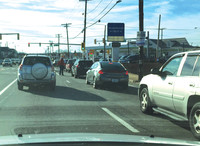By JACOB MARROCCO Rhode Island District Court Chief Judge William E. Smith granted a temporary restraining order Thursday on implementing the Cranston panhandling ordinance in a preliminary triumph for the R.I. American Civil Liberties Union. Smith said
This item is available in full to subscribers.
We have recently launched a new and improved website. To continue reading, you will need to either log into your subscriber account, or purchase a new subscription.
If you are a current print subscriber, you can set up a free website account by clicking here.
Otherwise, click here to view your options for subscribing.
Please log in to continue |
|


United States District Court Chief Judge William E. Smith granted a temporary restraining order Thursday on implementing the Cranston panhandling ordinance in a preliminary triumph for the R.I. American Civil Liberties Union.
Smith said that Cranston did not present any figures to support its claims that the 21 intersections considered to have high rates of car accidents were at all influenced by people standing the in the road.
“Although given the opportunity, Defendants submitted no evidence to support the safety issues identified in the findings, nor to support a conclusion that the distractions eliminated by the Ordinance are correlated with the number of traffic accidents at intersections,” Smith wrote. “Simply put, the legislative findings are long on conclusive observation but short on meaningful data connecting the chosen solution to an actual problem.”
Mayor Allan Fung took issue with that statement in a call to the Herald on Tuesday morning, using a case he presented to the judge during the hearing as an example. Fung nearly saw a man get struck by a vehicle on Reservoir Avenue in December of 2016.
“You don't have to have somebody already seriously killed or injured, this ordinance was designed to prevent serious accidents,” Fung said. “[The near accident] is something I personally witnessed, under the judge’s theory that guy should’ve been hit first. There have been too many close calls with individuals and it’s about safety for everyone in our roadways.”
Smith continued, saying the city also “failed” to detail how similar activities, such as people protesting and yelling on a sidewalk as opposed to a median strip, would prove to “less distracting.”
“The Court finds that the public has a significant interest in local policies that do not infringe individual First Amendment rights, and will not be harmed by the issuance of this temporary restraining order pending a final determination about whether the Ordinance is, in fact, a violation of the First Amendment,” Smith wrote toward the end of his six-page decision.
Fung had a response to that sentiment on Tuesday as well, noting that conducting transactions in the middle of the road is “a lot more dangerous” than on a sidewalk. He referenced the oft-mangled guardrail at the end of Route 37 as an example of some of the dangers of standing in a roadway.
“If we bring up my testimony, you will see the data I presented not only about accidents but I talked about dangers in the middle, whether it’s stop signs in the middle of a roadway that have been plowed over to all the debris that you see on these roadways.
Fung said Friday that he has confidence in DeSisto to win the case for Cranston. However, he said it was “disappointing and frustrating” to leaf through Smith’s ruling.
“We’ve heard from residents who were definitely upset about the ruling and urging us to continue on with the fight because they’ve experienced it themselves,” Fung said. “We’re going to continue fighting because this ordinance has been involved in public safety for everyone on our roads. We took our time to craft this ordinance.”
Council President Michael Farina, who cast the deciding vote on the ordinance in February, said Tuesday morning he had some questions about some of the judge’s comments. He will pose those questions to the city’s attorney, Marc DeSisto. The City Council will go into executive session during a special meeting on Thursday night to hear the next steps and pose any inquiries they may have.
“Usually with First Amendment cases as an abundance of caution the TRO would be granted,” Farina said. “[We want to] get some legal opinion as to what the next steps are and where we go from here. It’s pending litigation for us so this is something we wouldn't talk about openly.”
Council Vice President Michael Favicchio also released a statement, accusing the ACLU of wanting to put people in the middle of the roads as Cranston deals with more congestion as a result of increased business development.
“We have been working on proposals to widen various streets, such as New London Avenue, for a number of years and improve the flow of traffic,” Favicchio said. “Common sense would dictate that putting people in the middle of the street will work against what we are trying to accomplish.”
Since TROs are granted on an emergency basis, the next step for the ACLU is to seek a preliminary injunction. Executive Director Steven Brown said there would be a conference between the attorneys and the judge to set a hearing for the potential injunction.
For now, though, Brown is happy with the outcome.
“We’re very pleased,” Brown said of the TRO. “We know that the judge gave careful consideration to all the arguments that were made to him and we look forward to seeing the law permanently struck down at some point.”
Ward 1 Councilman Steven Stycos, who voted against the original ordinance, could not be reached for comment.
1 comment on this item Please log in to comment by clicking here
JustHope
I find it amusing that the article reports Mayor Fung "nearly saw a man get struck by a vehicle on Reservoir Ave. in December 2016." Yeah, and that was around the same time I "nearly saw" an alien spaceship on Reservoir Ave. great leadership Mr. Mayor. You'll make a good Governor I'm sure.
Sunday, August 13, 2017 Report this